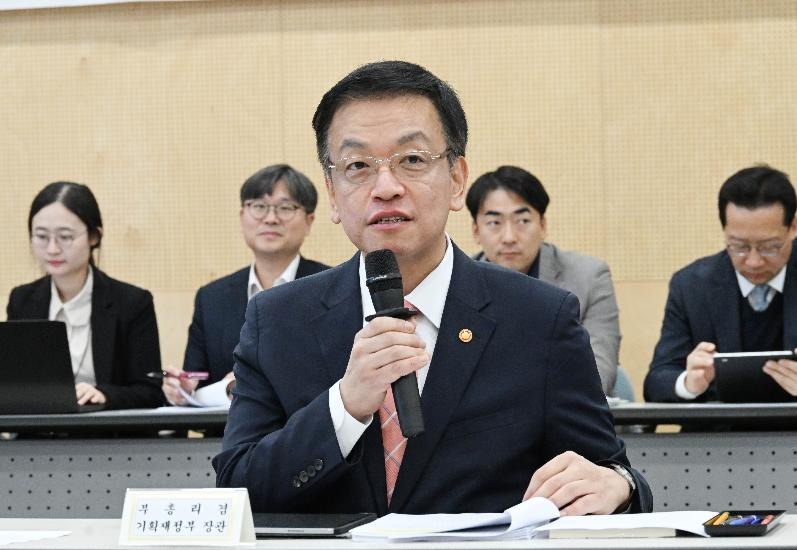
Deputy Prime Minister and Minister of Economy and Finance Choi Sang-mok on Nov. 27 speaks at a meeting of economy-related ministries on boosting industrial competitiveness at the Korea Semiconductor Industry Association in Seongnam, Gyeonggi-do Province. (Ministry of Economy and Finance)
By Charles Audouin
To help overcome the national semiconductor crisis, the government will ease the corporate burden of infrastructure at semiconductor clusters by expanding tax breaks for private research and development and facility investment.
The Ministry of Economy and Finance on Nov. 27 announced measures to bolster support for the domestic semiconductor ecosystem at a meeting of the heads of economy-related ministries on boosting industrial competitiveness at the Korea Semiconductor Industry Association in Seongnam, Gyeonggi-do Province.
“China’s latest pursuit and the launch of a new U.S. administration have raised uncertainty in the overall semiconductor sector,” the ministry said. “We will mobilize all possible resources to actively help companies to overcome the crisis and rebound.”
The government will pay for the installation of underground transmission cables at semiconductor complexes worth KRW 1.8 trillion under construction in the Gyeonggi-do cities of Yongin and Pyeongtaek. It will also seek to attract overseas talent in state-of-the-art technologies and expand incentives for top faculty from the country’s top four advanced institutes of science and technology and specialized graduate schools.
Also under consideration is inclusion of R&D facility investment in the tax credit for investment in national strategic technologies and raising the latter for semiconductor companies. To support chip output in the country, quota tariffs will be applied to key raw materials for semiconductor manufacturing.
Over KRW 14 trillion in policy financing will be injected next year in the overall chip sector. This will include KRW 4.25 trillion for the low-interest loan program for semiconductors of the Korea Development Bank and KRW 42 billion in related fund investment.
In addition, the government signed a deal with major chip players like Samsung Electronics and SK Hynix on the supply of electrical power and water to the Yongin cluster. Under the deal, 3 gigawatts of power will go to the compound and general industrial complexes by 2030 and water by 2031.
caudouin@korea.kr























